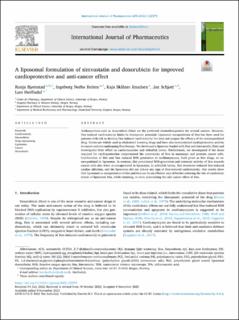A liposomal formulation of simvastatin and doxorubicin for improved cardioprotective and anti-cancer effect
Bjørnstad, Ronja; Reiten, Ingeborg Nerbø; Knudsen, Kaja Skålnes; Schjøtt, Jan Didrik; Herfindal, Lars
Journal article, Peer reviewed
Published version

Åpne
Permanent lenke
https://hdl.handle.net/11250/3049751Utgivelsesdato
2022Metadata
Vis full innførselSamlinger
- Department of Clinical Science [2318]
- Registrations from Cristin [9791]
Originalversjon
International Journal of Pharmaceutics. 2022, 629, 122379. 10.1016/j.ijpharm.2022.122379Sammendrag
Anthracyclines such as doxorubicin (Dox) are the preferred chemotherapeutics for several cancers. However, Dox-induced cardiotoxicity limits its therapeutic potential. Liposomal encapsulation of Dox has been used for patients with risk to develop Dox induced cardiotoxicity but does not surpass the efficacy of the unencapsulated drug. Statins are widely used as cholesterol lowering drugs and have also demonstrated cardioprotective activity in cancer patients undergoing Dox therapy. We developed a liposome loaded with Dox and simvastatin (Sim) and investigated their effect on cardiomyocytes and zebrafish larvae. Furthermore, we investigated if the doses required for cardioprotection compromised the cytotoxicity of Dox in mammary and prostate cancer cells. Combination of Sim and Dox reduced ROS generation in cardiomyocytes, both given as free drugs, or co-encapsulated in liposomes. In contrast, Sim potentiated ROS-generation and cytotoxic activity of Dox towards cancer cells also when co-encapsulated in liposomes. In zebrafish larvae, Sim treatment reduced Dox-induced cardiac affection, and the liposomes did not induce any sign of Dox-induced cardiotoxicity. Our results show that liposomal co-encapsulation of Sim and Dox can be an efficient way of further reducing the risk of cardiotoxic events of liposomal Dox, while retaining, or even potentiating the anti-cancer effect of Dox.
